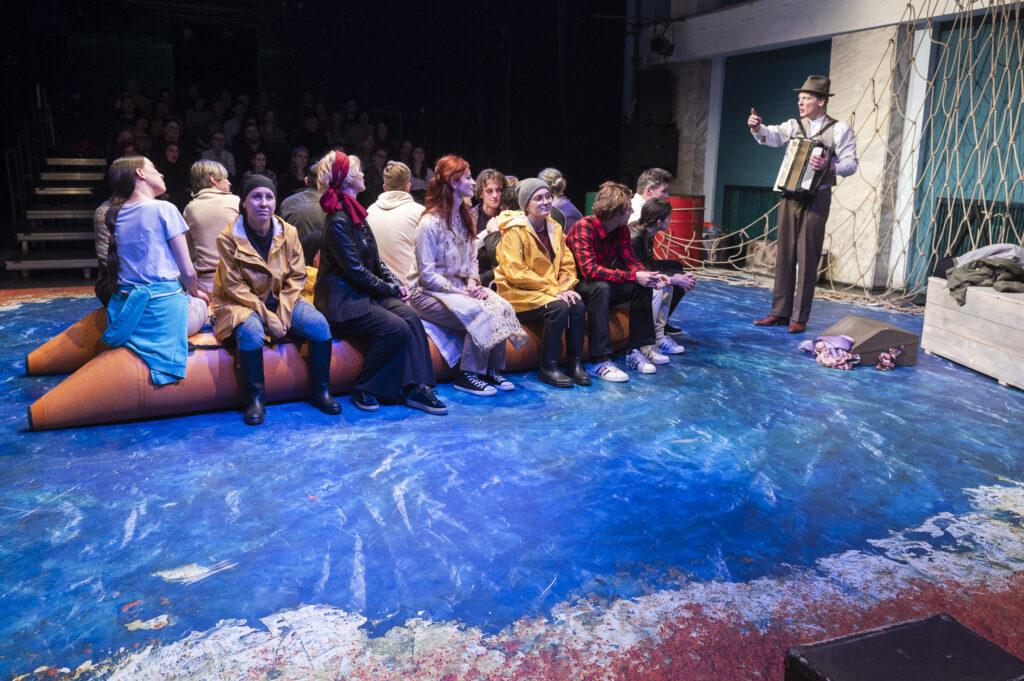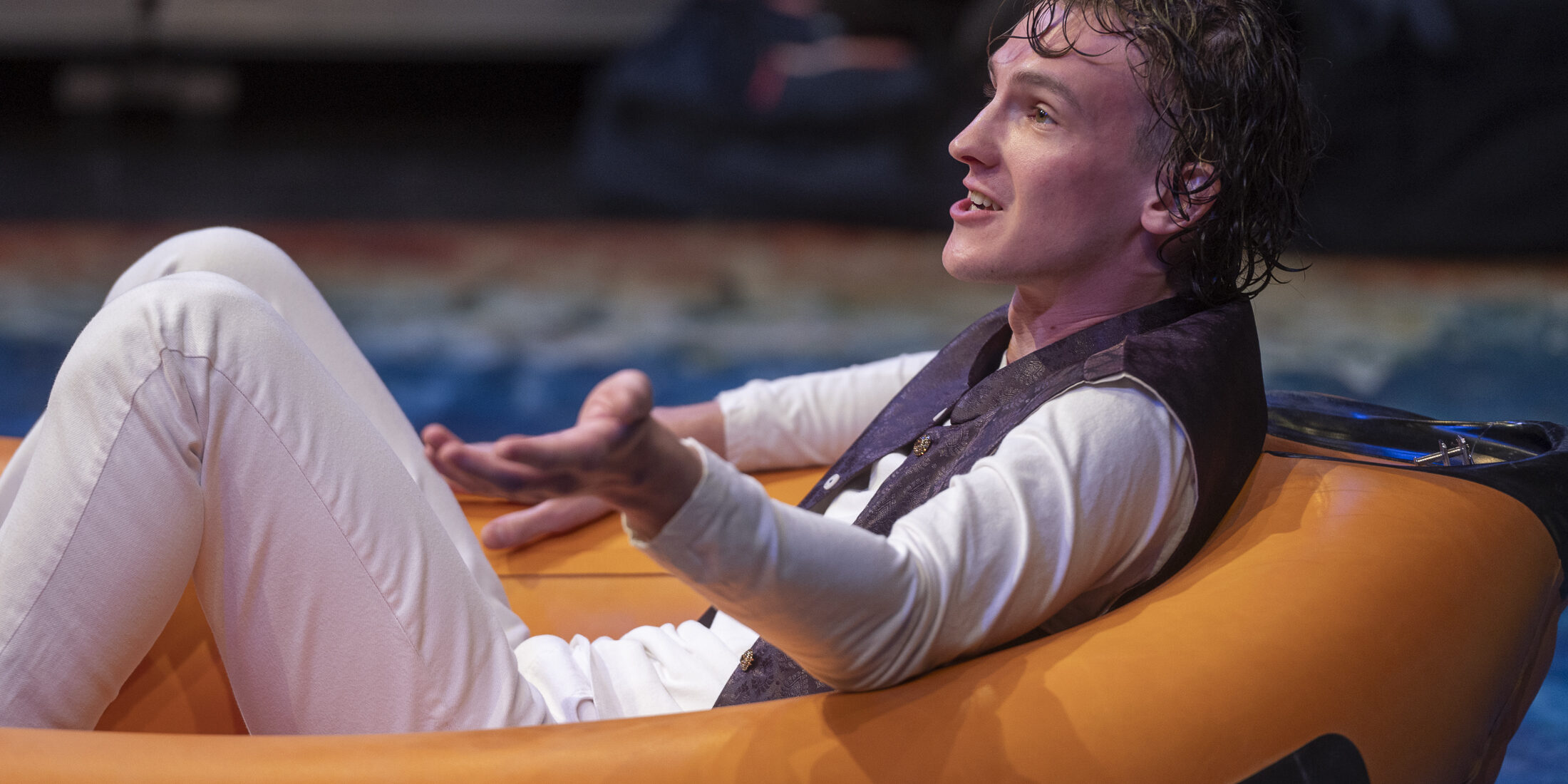Hungarian State Theatre “Csiky Gergely”, Timisoara, premiere 8th March 2024
An orange rubber boat stands on the stage with a motionless body inside. The stage of the Hungarian State Theatre “Csiky Gergely” is covered with a digital painting of the sea and its crashing waves, one wonders who the wet, motionless actor in the boat represents. Is it an asylum seeker on his way to Europe? Has he drowned while crossing the Mediterranean?
As it turns out, this interpretation could be true, but if you take it literally, you would miss the point of the performance. The actor in the boat represents the young Pericles – from Shakespeare’s play of the same name – who has drowned but is still alive. Director Philip Parr and dramaturg Dálnoky Réka have staged Pericles in such a way that the original context of the play and its narrative structure have been retained. The most significant changes to the text are the moderate shortening of certain lines and scenes and the deletion of marginal characters.
While the dramaturgy of the performance corresponds to the dramaturgy of the play and the story takes place in antiquity, visually the production nods to contemporary issues such as migrant crises and perilous sea crossings. After the opening scene when Pericles awakes in the boat after a drowning incident, the whole ensemble comes out on stage dressed in contemporary costumes and carrying coffers and backpacks (set and costume design: Brian D. Hanlon). Although it’s never explicitly spoken, they irresistibly resemble modern-day travellers or, if you will, migrants. And given that the auditorium is split in two parts, opposite to one another with the stage in the middle, the audience can always see each other while watching the performance, which is a clear sign that this is not a purely illusionistic show but one to be observed with critical taught.
Associatively linking Pericles to modern-day migrant crises is no arbitrary concept. Though the play is written as an episodic adventurous tale full of cliff-hangers, it deals with themes of loss and revival, exiles and migration, violence and sex trafficking. It’s set in ancient Greek seas, a pathway between the Middle East and Europe, and follows the titular character (a fictional prince, not the Greek statesman), who comes close several times to death or losing everything that he holds dear but eventually laboriously prevails. It is a story of a person being forced to abandon their whole life and try to find safety and happiness in another place and culture. In that sense, Pericles undoubtedly resembles stories of so many asylum seekers who are risking their lives to come to Europe.

Pericles at “Csiky Gergely” Hungarian State Theatre, Timișoara,
If we were to speak generally of British versus continental European tendencies towards the text – while acknowledging there are exceptions, of course -the British approach tends to be more faithful, awe-like and, many would say, uncreative, while continental directors are known for more playful interpretations. The tension between these two approaches can be felt in this iteration of Pericles, which makes sense as it is coming from the director who works both in the UK and internationally. The result is a compromise between a faithful theatrical reading of the play with minimal dramaturgical interventions and clear associations to modern-day social problems thanks to the contemporary visual elements.
However, sticking too faithfully to a text that’s riddled with structural and dramaturgical shortcomings inevitably creates problems in the production as well. Thanks to Shakespeare’s co-authorship with the pamphleteer George Wilkins, the play was written in a sensationalist fashion, often putting a bigger accent of thrills than on the coherence of the story. Some scholars and theatre-makers even argue that the first two acts are so bad that they must have been solely written by George Wilkins. And it’s the first two acts where most of the problems of the production occur – there are scenes that are only adventurous interludes between plot points and that in no meaningful way advance the story. In other words, there was significant room to further shorten the text for a contemporary adaption.
Directing a play with such a sprawling narrative structure and numerous characters can be another challenge but Philip Parr and the actors of “Csiky Gergely” Theatre used the play to create a production that’s first and foremost an ensemble performance. More than 20 actors engaged in the creation of the show, most of them playing more than one character, and the heights of their collaboration are the collective scenes when they dance celebratorily at the end of their performance (choreography: Anca Stoica) and play live music with their bodies and a few instruments (Cári Tibor).
I had a chance to see Pericles at its premiere and the first reprise the day after. What’s curious is that young Pericles – who appears in the first three acts – is played by two different actors on different nights of the performance. Erdős Bálint played Pericles at the premiere, while Jancsó Előd performed the hero at the reprise. Their acting is strikingly synchronized while playing the meek but honorable character that, at the first few minutes of the show, I forgot that the performers changed. Molnos András Csaba plays Pericles in the last two acts – on all performing nights – bringing a dose of maturity and remorse to the role.
It’s worth noting at the end that this is a multicultural performance in the full meaning of the word. Not only does it thematize the plight of migrants crossing cultural boundaries, it is collaboration between a British-based director and a Hungarian theatre in Romania. Even with certain shortcomings, the production proved to be a worthy intercultural cross-examination of a classic play.
For more information, visit: tm-t.ro
Further reading: review of 1978 at Hungarian State Theatre “Csiky Gergely”
Borisav Matić is a critic and dramaturg from Serbia. He is the Regional Managing Editor at The Theatre Times. He regularly writes about theatre for a range of publications and media.
He’s a member of the feminist collective Rebel Readers with whom he co-edits Bookvica, their platform for literary criticism, and produces literary shows and podcasts. He occasionally works as a dramaturg or a scriptwriter for theatre, TV, radio and other media. He's the administrator of IDEA - the International Drama/Theatre and Education Association.








